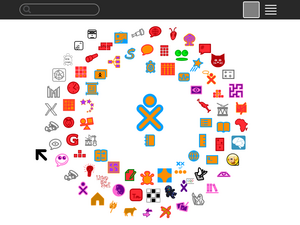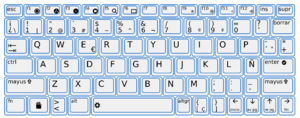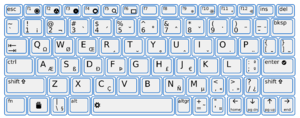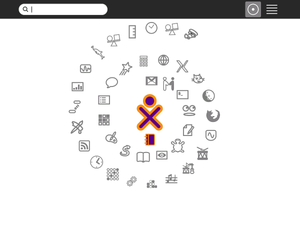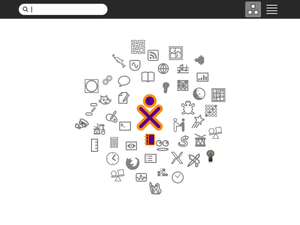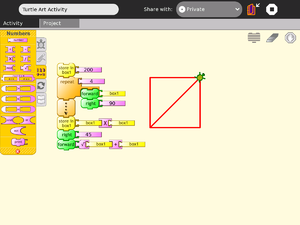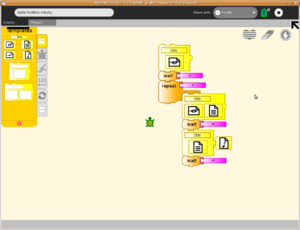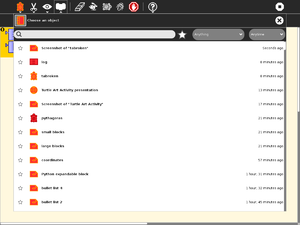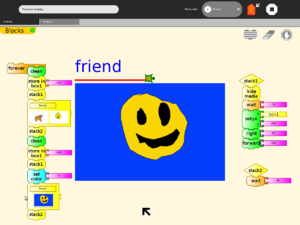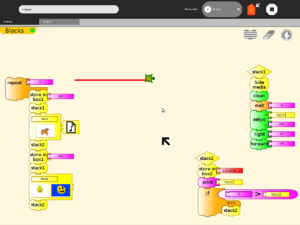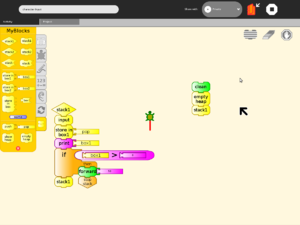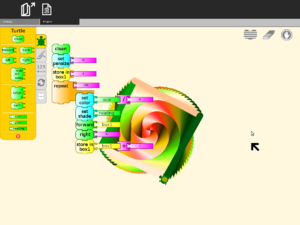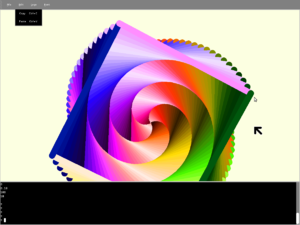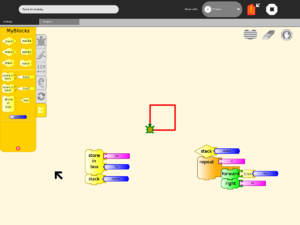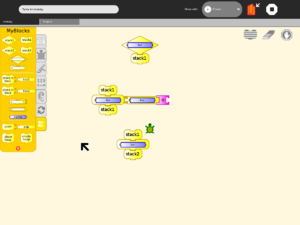User:Walter
Walter Bender
I was at OLPC for several years and now I am a volunteer on the project. My home page can be found here: [1]
Email: walter AT sugarlabs DOT org
bio
Walter Bender is founder and executive director of Sugar Labs, a non-profit foundation. In 2006, Bender co-founded the One Laptop per Child, a non-profit association with Nicholas Negroponte and Seymour Papert. As director of the MIT Media Laboratory, Bender led a team of researchers in fields as varied as tangible media to affective computing to lifelong kindergarten. In 1992, Bender founded the MIT News in the Future consortium, which launched the era of digital news.
bio en es
Walter Bender es el director de la Fundación Sugar Lab, una organización sin fines de lucro, desde donde ha diseñado el sistema operativo SUGAR que utilizan las computadoras XO de la organización OLPC (One Laptop per Child) Una Computadora por estudiante. Uno de los objetivos de Sugar Lab es ofrecer un espacio de reunión y apoyo para una creciente comunidad de educadores y desarrolladores de software que quieran extender la plataforma de Sugar y quienes han estado creando aplicaciones compatibles con esta. Antes de fundar el Sugar Lab, Walter fue parte de la organización OLPC todavía apoya los esfuerzos de esa organización en el desarrollo y diseminación de tecnologías que puedan revolucionar el mundo de los niños y niñas y los atraigan hacia el aprendizaje. Entre los años 2000 y 2006 Walter fue el Director Ejecutivo del Laboratorio de Medios Media Lab, del Instituto Tecnológico de Massachusetts MIT donde además, por muchos años dirigió el grupo de investigación llamado Las Noticias de Futuro que se fundó en 1996 y su proyecto Publicación Electrónica. En el marco de las investigaciones Publicación Electrónica Walter ayudó a desarrollar en el siglo pasado las herramientas tecnológicas para promover lo que hoy en el siglo XXI conocemos como periodismo ciudadano.
Walter tiene dos experiencias realmente pioneras relacionados con el periodismo ciudadano.
Una se llama los Silver Stringers o Periodistas de Plata, que reúne a un grupo de personas de la tercera edad de la comunidad de Melrose en Massachusetts que publican su periódico sistemáticamente para lo cual siguen el proceso que se lleva a cabo en los grandes medios de comunicación masivo. Para esta experiencia, Walter contó con el apoyo de Jack Driscoll, Editor Pensionado del diario The Boston Globe. Es interesante mencionar que una de las ediciones de Silver Stringers en el año 2001 estuvo dedicada a Costa Rica, cuando algunos de los vecinos de Melrose vinieron de vacaciones a nuestro país y reportaron en el periódico The Silver Stringers o los Periodistas de Plata sobre sus aventuras aquí.
La otra experiencia es el Junior Journal o el Diario Joven, que iniciando 1998 reunió a 300 jóvenes, niños y niñas entre los 13 y los 18 años, viviendo en muchos países alrededor del mundo para, en aquella época (pre web y pre redes sociales) escribir artículos de interés nacional, regional y mundial, editarlos y publicarlos mensualmente en su periódico. Otras experiencias semejantes con niños, niñas y jóvenes incluyen La Fragola en Italia que a la fecha cuenta con 7400 periódicos escolares y colegiales en línea.
Desde todas estas perspectivas Walter ha hecho una importante contribución al conocimiento en las áreas de publicación electrónica, medios digitales y tecnologías para aprender.
Regarding the Sugar Labs Oversight Board
While it has been my goal to help get Sugar Labs to a point of self-sustainability, I don't think we are yet at that point. My goals for 2010 are to focus on fund-raising and further refining the organizational and governance models.
A bit about me and my role in Sugar Labs: I was part of the Sugar team at One Laptop per Child that left to found Sugar Labs in March of 2008. I have worn a few different hats within the organization: activity developer, occasional contributor to Sugar core, member of the deployment team, the marketing team, and the activity team. I was a lead author of the FLOSS Manual on Sugar. I am presently the executive director of Sugar Labs. I also represent Sugar on the GNOME technical advisory board and the Squeakland board. I have been a GSOC mentor and am participating in several pilot deployment projects of Sugar on a Stick.
OWF talk
Pakistan talk
CLEI talk
File:CLEI.odp(es) video(es y en)
Libre Planet talk
To do
get Frame test set up in Peru/Uruguay/Paraguay</srike>New Activity templates
Much of the information that is consistent across activities can be held in activities.s.o. (dfarning 22:28, 16 June 2008 (UTC))
- Follow-up with Linux Foundation
Draft membership agreement for Sugar Labsrebase Turtle Art on SVGask SFC for pointers to lawyers in SAstart writing NSF/USAID proposallocal-labs proposalsNSF Creativity grantBabson brief- Watertown follow-up
- Curriculum guides from GPA programs
Done
- New Getting Started Guide (See The Sugar FLOSS Manual)
- Add ParserFunctions to Sugar Labs mediawiki
- Draft rules of governance for Sugar Labs
- Start Community-News Sugar Weekly Digest list
- CoSN proposal
- rebase Gmail on new Browse
- Finalize arrangements with SFC
- Incorporate Sugar Labs
Recent writing about Sugar and learning
(I also blog the weekly Sugar Digest.)
The slides from a talk I gave about Sugar at the Women2Woman conference are here and here.
Sandbox
Home View
A new, tighter spiral for the Home View:
class MyLayout(RingLayout):
"""Spiral layout based on Archimedean spiral: r = a + b*theta."""
__gtype_name__ = 'MyLayout'
icon_name = 'view-mylayout'
"""Name of icon used in home view dropdown palette."""
profile_key = 'my-layout'
"""String used in profile to represent this view."""
def __init__(self):
RingLayout.__init__(self)
self.my_radius = _MINIMUM_RADIUS
self.my_orientation = math.pi
def _calculate_radius_and_icon_size(self, children_count):
"""Stub out this method; not used in `My Layout`."""
return _MINIMUM_RADIUS, style.STANDARD_ICON_SIZE
def _calculate_position(self, radius, icon_size, index, children_count):
""" Increment the radius as you go """
if index == 0:
self.my_radius = _MINIMUM_RADIUS
self.my_orientation = math.pi
x, y = self._calculate_xy()
# add some buffering around the icon
self._calculate_new_radius_orientation(icon_size + 10)
width, height = self.box.get_allocation()
return int(x) + (width - icon_size) / 2, \
int(y) + (height - icon_size - (style.GRID_CELL_SIZE / 2) ) / 2
def _calculate_xy(self):
""" Convert r, o to x, y """
return -math.sin(self.my_orientation) * self.my_radius, \
math.cos(self.my_orientation) * self.my_radius
def _calculate_new_radius_orientation(self, icon_size):
""" Based upon current radius, calculate new increments """
circumference = self.my_radius * 2 * math.pi
n = circumference / icon_size
self.my_orientation += 2 * math.pi / n
self.my_radius += float(icon_size) / n
This version inherits from RandomLayout and lets you rearrange the icons.
class MyLayout(RandomLayout):
"""Spiral layout based on Archimedean spiral: r = a + b*theta."""
__gtype_name__ = 'MyLayout'
icon_name = 'view-mylayout'
"""Name of icon used in home view dropdown palette."""
profile_key = 'my-layout'
"""String used in profile to represent this view."""
def __init__(self):
RandomLayout.__init__(self)
self.my_radius = _MINIMUM_RADIUS
self.my_orientation = math.pi
def _calculate_radius_and_icon_size(self, children_count):
"""Stub out this method; not used in `My Layout`."""
return _MINIMUM_RADIUS, style.STANDARD_ICON_SIZE
def _calculate_position(self, icon_size):
""" Increment the radius as you go """
x, y = self._calculate_xy()
# add some buffering around the icon
self._calculate_new_radius_orientation(icon_size + 10)
width, height = self.box.get_allocation()
return int(x) + (width - icon_size) / 2, \
int(y) + (height - icon_size - (style.GRID_CELL_SIZE / 2) ) / 2
def _calculate_xy(self):
""" Convert r, o to x, y """
return -math.sin(self.my_orientation) * self.my_radius, \
math.cos(self.my_orientation) * self.my_radius
def _calculate_new_radius_orientation(self, icon_size):
""" Based upon current radius, calculate new increments """
circumference = self.my_radius * 2 * math.pi
n = circumference / icon_size
self.my_orientation += 2 * math.pi / n
self.my_radius += float(icon_size) / n
def append(self, icon, locked=False):
""" Instead of assigning the position based on a hash, use spiral """
FavoritesLayout.append(self, icon, locked)
min_width_, child_width = icon.get_width_request()
min_height_, child_height = icon.get_height_request(child_width)
min_width_, width = self.box.get_width_request()
min_height_, height = self.box.get_height_request(width)
if icon in self.fixed_positions:
x, y = self.fixed_positions[icon]
x = min(x, width - child_width)
y = min(y, height - child_height)
else:
x, y = self._calculate_position(child_width)
if x is None or y is None:
self._grid.add(icon,
child_width / _CELL_SIZE, child_height / _CELL_SIZE)
else:
self._grid.add(icon,
child_width / _CELL_SIZE, child_height / _CELL_SIZE,
x / _CELL_SIZE, y / _CELL_SIZE)
Keyboards
I used to design the keyboards for OLPC. I am doing one for them for a 'high-school' version of the XO-1.5. Here is a first pass:
Misc.
Floss Manual
<img src=" "/>
<style>
"/>
<style>
@import url("http://en.flossmanuals.net/bookstore/bookstore.css");
</style>
<script src="http://en.flossmanuals.net/bookstore/bookstore.js" type="text/javascript"></script> <script type="text/javascript"> FM.init({"paging":true,"preferred":["OLPC LAPTOP USERS GUIDE","SUGAR USERS GUIDE"]}); </script>
Portfolio
I am making a "TurtleArt: inspired portfolio tool. See TAPortfolio for more details.
Turtle Art → Logo
I added a "view source" for Turtle Art that exports Logo.
Some procedures for setting up the palette and the shade functionality:
to tasetpalette :i :r :g :b :myshade make "s ((:myshade - 50) / 50) ifelse lessp :s 0 [ make "s (1 + (:s *0.8)) make "r (:r * :s) make "g (:g * :s) make "b (:b * :s) ] [ make "s (:s * 0.9) make "r (:r + ((100-:r) * :s)) make "g (:g + ((100-:g) * :s)) make "b (:b + ((100-:b) * :s)) ] setpalette :i (list :r :g :b) end
to rgb :myi :mycolors :myshade make "myr first :mycolors make "mycolors butfirst :mycolors make "myg first :mycolors make "mycolors butfirst :mycolors make "myb first :mycolors make "mycolors butfirst :mycolors tasetpalette :myi :myr :myg :myb :myshade output :mycolors end
to processcolor :mycolors :myshade if emptyp :mycolors [stop] make "i :i + 1 processcolor (rgb :i :mycolors :myshade) :myshade end
to tasetshade :shade make "myshade modulo :shade 200 if greaterp :myshade 99 [make "myshade (199-:myshade)] make "i 7 make "mycolors :colors processcolor :mycolors :myshade end
to tasetpencolor :c make "color modulo round :c 100 setpencolor :color + 8 end
make "colors [ 100 0 0 100 5 0 100 10 0 100 15 0 100 20 0 100 25 0 100 30 0 100 35 0 100 40 0 100 45 0 100 50 0 100 55 0 100 60 0 100 65 0 100 70 0 100 75 0 100 80 0 100 85 0 100 90 0 100 95 0 100 100 0 90 100 0 80 100 0 70 100 0 60 100 0 50 100 0 40 100 0 30 100 0 20 100 0 10 100 0 0 100 0 0 100 5 0 100 10 0 100 15 0 100 20 0 100 25 0 100 30 0 100 35 0 100 40 0 100 45 0 100 50 0 100 55 0 100 60 0 100 65 0 100 70 0 100 75 0 100 80 0 100 85 0 100 90 0 100 95 0 100 100 0 95 100 0 90 100 0 85 100 0 80 100 0 75 100 0 70 100 0 65 100 0 60 100 0 55 100 0 50 100 0 45 100 0 40 100 0 35 100 0 30 100 0 25 100 0 20 100 0 15 100 0 10 100 0 5 100 0 0 100 5 0 100 10 0 100 15 0 100 20 0 100 25 0 100 30 0 100 35 0 100 40 0 100 45 0 100 50 0 100 55 0 100 60 0 100 65 0 100 70 0 100 75 0 100 80 0 100 85 0 100 90 0 100 95 0 100 100 0 100 100 0 90 100 0 80 100 0 70 100 0 60 100 0 50 100 0 40 100 0 30 100 0 20 100 0 10] make "shade 50 tasetshade :shade
to tasetbackground :color :shade tasetshade :shade setbackground :color + 8 end
The project:
to ta clearscreen tasetbackground 21 100 setpensize 25.0 make "box1 0.0 repeat 300.0 [ tasetpencolor xcor / 6.0 tasetshade heading forward :box1 right 91.0 make "box1 :box1 + 1.0 ] end
ta
Turtle Art variables
Following the lead of Luis Michelena, I've added named blocks and stacks. I plan to add push and pop next, which should greatly expand the range of possible constructions.
Turtle Art push and pop
While it is not the intent that Turtle Art be a full implementation of Logo, but there has been some discussion on teh Sur list about adding some capability for passing arguments to stacks. (and to support recursion). I have added a FILO and push and pop blocks to enable this functionality. I am looking for feedback. regarding this choice.
HBS-style analysis
- our points of difference
- our points of parity
- their points of difference

























